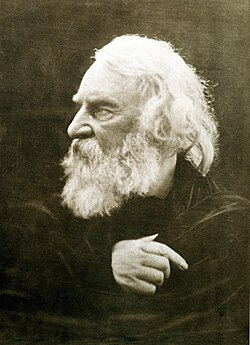Henry Wadsworth Longfellow Quote
With favoring winds, o'er sunlit seas,We sailed for the Hesperides,The land where golden apples grow;But that, ah! that was long ago.How far, since then, the ocean streamsHave swept us from that land of dreams,That land of fiction and of truth,The lost Atlantis of our youth!Whither, ah, whither? Are not theseThe tempest-haunted Orcades,Where sea-gulls scream, and breakers roar,And wreck and sea-weed line the shore?Ultima Thule! Utmost Isle!Here in thy harbors for a whileWe lower our sails; a while we restFrom the unending, endless quest.
Henry Wadsworth Longfellow
With favoring winds, o'er sunlit seas,We sailed for the Hesperides,The land where golden apples grow;But that, ah! that was long ago.How far, since then, the ocean streamsHave swept us from that land of dreams,That land of fiction and of truth,The lost Atlantis of our youth!Whither, ah, whither? Are not theseThe tempest-haunted Orcades,Where sea-gulls scream, and breakers roar,And wreck and sea-weed line the shore?Ultima Thule! Utmost Isle!Here in thy harbors for a whileWe lower our sails; a while we restFrom the unending, endless quest.
Related Quotes
She was a gypsy, as soon as you unravelled the many layers to her wild spirit she was on her next quest to discover her magic. She was relentless like that, the woman didn't need no body but an open r...
Nikki Rowe
Tags:
adventure, artist, authentic, balance, brave heart, courage, empowering women, free spirit, freedom, growth
People lack morals, good moral character is important in every aspect of your life. Honesty and Integrity opens the door. Your character allows others to see you for who you truly are. Make your first...
Amaka Imani Nkosazana
Tags:
abundance, adventure, aspects, believe, character, complete, completeness, difference, differences, friendship
About Henry Wadsworth Longfellow
Henry Wadsworth Longfellow (February 27, 1807 – March 24, 1882) was an American poet and educator. His original works include the poems "Paul Revere's Ride", The Song of Hiawatha, and Evangeline. He was the first American to completely translate Dante Alighieri's Divine Comedy and was one of the fireside poets from New England.
Longfellow was born in Portland, District of Maine, Massachusetts (now Portland, Maine). He graduated from Bowdoin College and became a professor there and, later, at Harvard College after studying in Europe. His first major poetry collections were Voices of the Night (1839) and Ballads and Other Poems (1841). He retired from teaching in 1854 to focus on his writing, and he lived the remainder of his life in the Revolutionary War headquarters of George Washington in Cambridge, Massachusetts.
His first wife, Mary Potter, died in 1835 after a miscarriage. His second wife, Frances Appleton, died in 1861 after sustaining burns when her dress caught fire. After her death, Longfellow had difficulty writing poetry for a time and focused on translating works from foreign languages. Longfellow died in 1882.
Longfellow wrote many lyric poems known for their musicality and often presenting stories of mythology and legend. He became the most popular American poet of his day and had success overseas. He has been criticized for imitating European styles and writing poetry that was too sentimental.
Longfellow was born in Portland, District of Maine, Massachusetts (now Portland, Maine). He graduated from Bowdoin College and became a professor there and, later, at Harvard College after studying in Europe. His first major poetry collections were Voices of the Night (1839) and Ballads and Other Poems (1841). He retired from teaching in 1854 to focus on his writing, and he lived the remainder of his life in the Revolutionary War headquarters of George Washington in Cambridge, Massachusetts.
His first wife, Mary Potter, died in 1835 after a miscarriage. His second wife, Frances Appleton, died in 1861 after sustaining burns when her dress caught fire. After her death, Longfellow had difficulty writing poetry for a time and focused on translating works from foreign languages. Longfellow died in 1882.
Longfellow wrote many lyric poems known for their musicality and often presenting stories of mythology and legend. He became the most popular American poet of his day and had success overseas. He has been criticized for imitating European styles and writing poetry that was too sentimental.
